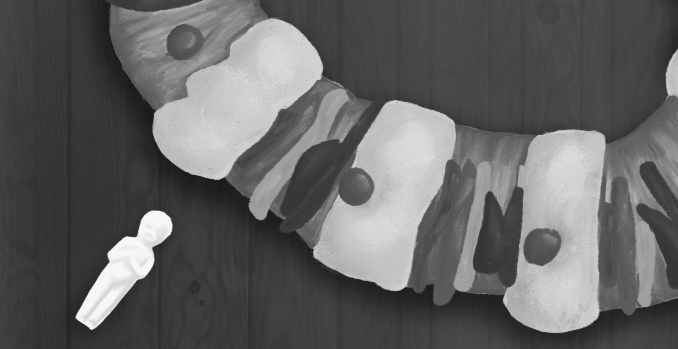
more baby Jesus’ can be found in the bread, used to decide who will make tamales for the family.
Within the Latine community, there are traditions that are practiced every year. Most of these traditions are based on a religious influence, but nowadays they have adapted to become less religious and more of a time to get together with family and celebrate. Posadas are a Catholic celebration that is practiced between Dec. 16 and Dec. 24, that retells the story of baby Jesus’ birth. Traditionally a rosary is prayed, then the women and men separate and sing a song that tells the story of a pregnant Mary and Joseph trying to get hospitality in Bethlehem. It is usually followed by a variety of food, like tamales, pozole, and atole. Then the children get to break the piñata, the piñata is filled with candies and sometimes even small toys. At the end of the festivities the children sometimes even get goodie bags, filled with treats.
“Posadas are my favorite holiday tradition,” Junior Kyle Garcia said. “ My family always comes together to celebrate and we always end up having a blast!” El Dia de Los Reyes Magos (The Day of the Three Kings), is celebrated every year on Jan. 6th. It is supposed to represent the day the three kings went to go visit baby Jesus and shower him with gifts. The three kings, Gaspar, Melchior, and Balthasar, each ride a different animal which consists of an elephant, camel, and a horse. It is a tradition for many Hispanic children to leave their shoe under their tree the night before. It is usually filled with hay for the camel. In return, the three kings leave candies and toys for the well-behaved children.
“I used to brag when I was younger to other kids because it would feel like I had two Christmases!” Junior Sielo Gutierrez said. “January 6th holds some of my fondest childhood memories.”
Another tradition involved on Jan. 6th would be the Rosca. It is traditionally a large piece of bread that is shaped like an oval-sized donut. In the Rosca, there are three or more mini plastic baby Jesus’ hidden inside the bread. The Rosca is cut into pieces and handed out to everyone, whoever gets the baby Jesus in their piece has to cook tamales or another traditional food for
the whole family. The food is eaten on Feb. 2, which is related to another Catholic festivity, El dia de la Candelaria. “Our whole family comes together, whoever ‘wins’ [gets the baby Jesus] has to make tamales for the whole family,” Sophomore, Jasmine Alvarez said. Este artículo estará disponible en español en la página del Pony Express, smhsponyexpress.com





































